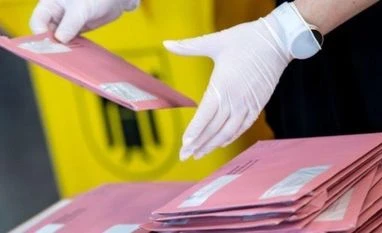The counting for Karnataka state Assembly elections is underway. While the results are expected to be out by the evening, the counting of postal ballots takes place before the votes of normal people start.
According to early trends, Congress is leading the counting, with Bharatiya Janata Party (BJP) in the second spot and Janata Dal (Secular) [JD(S)] in the third spot.
What is postal voting?
Postal voting is a facility that is given to a restricted set of voters who can cast their vote remotely on a ballot paper and then send it back to the election officer. These votes are counted before the electronic voting machines (EVMs) are opened.
The returning officer needs to print the ballot paper for the eligible voters within 24 hours of the last date of nomination withdrawal and then dispatch it within the next 24 hours.
After receiving it, the voters can mark their preference with a tick or a cross mark against the name of the candidate. They also need to fill out a duly attested declaration, Form 13-A. The ballot paper and the declaration are then put in a sealed cover and sent to the returning officer.
More From This Section
Who can vote through ballot paper?
Members of the armed forces like the Army, Navy and Air Force, members of the armed police force of a state (serving outside the state), government employees posted outside India and their spouses are entitled to vote only by post. They cannot vote in person.
Special voters such as the President of India, vice-president, governors, union cabinet ministers, speaker of the house and government officers on poll duty have the option to vote by post. But they have to apply through a prescribed form to avail of this facility.
Absentee voters, who are unable to physically cast their vote due to their service, such as railway employees posted outside the state can exercise their vote through postal ballots.
How are postal ballots counted?
At the counting centre, each counting table receives not more than 500 ballots in each round of counting with up to four tables dedicated to calculating just postal ballots.
Staff involved in postal ballot counting are trained specifically about all aspects of postal ballot voting. First, the declaration of postal voters is checked for any issues. All legitimate declarations are then collected and sealed before the ballots are opened and tallied.
After the counting, the observer and returning officer tally all the ballots with the results. The process needs to be videographed to ensure secrecy. The recording of the video must be sealed in a separate envelope.
Do postal ballots show real trends?
The postal ballots show trends as per a small number of voters. It is not necessary that the early trends hold once the EVMs are opened.
)